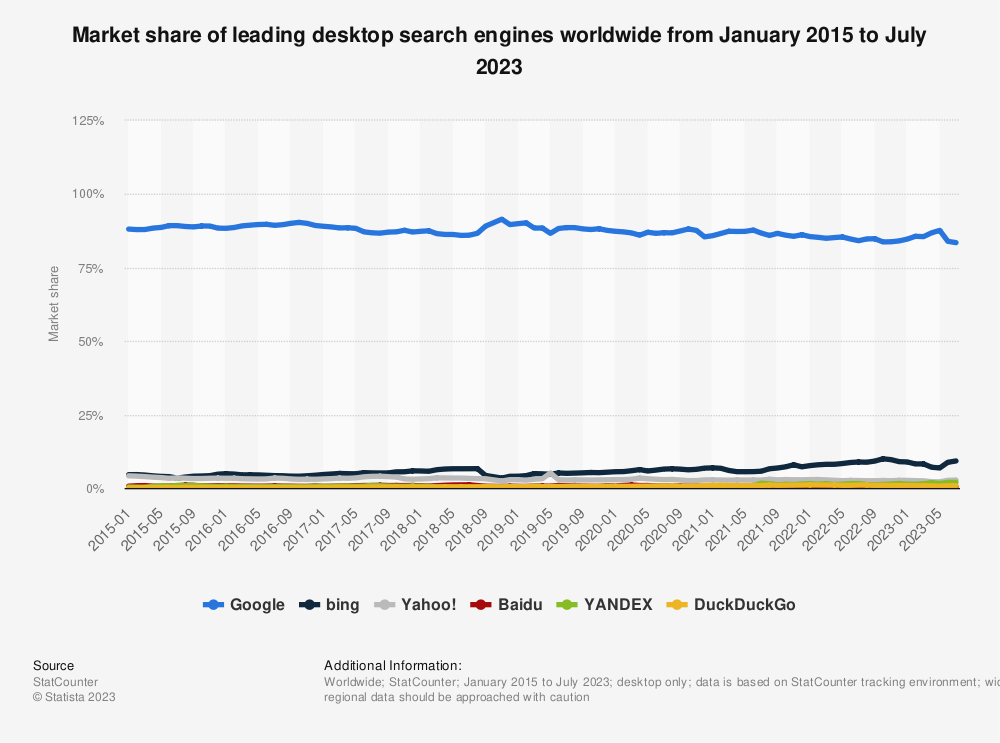
Is the Pharmaceutical Sector in Saudi Arabia Unlocking the Full Potential of Online Visibility and E-Reputation?
In today’s digital-first landscape, a pharmacy’s online reputation and local visibility can strongly influence a…

Table of contents
Looking ahead to 2024, tracking the pulse of search is more critical than ever. Local brands are increasingly reliant on the visibility provided by search engines. With consumer journeys often beginning with a quick search on a mobile device, securing a prominent position on these platforms can make or break a brand’s discovery.
However, capturing the attention of today’s easily distracted consumers is no easy feat. As evidence of this, the SEO market is booming, with projections indicating that it will skyrocket to a staggering $122.11 billion by 2028, growing at a compound annual growth rate of 9.6%.
Changes at the top of the search engine hierarchy add a layer of complexity. Despite Microsoft’s huge investments in AI for Bing, their market shares have not seen any significant change. At the same time, Yandex, once the benchmark platform in Russia (and the former Eastern Bloc), is now considering selling its activities on Russian territory.
This strategic shift has left a void that competitors, including Microsoft, are eager to fill. The uncertainty surrounding Yandex’s future underscores the volatile nature of the consumer technology sector. This demonstrates to businesses that excessive reliance on only a couple networks can pose serious risks.

Despite the turbulence in the industry, one player remains steadfast. Recent usage statistics reveal that Google continues to dominate the search engine market, commanding a staggering 91.7% of global search traffic. When it comes to mobile searches, where many local journeys begin, Google’s market share exceeds 95%. These figures underscore Google’s unrivalled effectiveness as a platform for local advertisers navigating the increasingly complex digital landscape.
Ready for a deep dive? Let’s get started.
Yandex, once a dominant force in Russia and the former USSR region, is now contemplating the sale of its domestic business assets. This potential divestiture marks a significant shift for the company, which has long been a major player in emerging post-Soviet states. On top of this, fears of nationalization loom heavy over a company operating in a challenging, war-torn market.
The possibility of Yandex exiting the domestic market has created a vacuum that other search engines are eager to fill. Major players, including Google and Bing, are likely to seize this opportunity to expand their presence and market share.
Despite the changes and challenges in the search engine market, Google remains the undisputed leader. Its advanced algorithms, extensive data collection and user-friendly interface helped it record 85.3 billion visits in July alone, with each visitor spending an average of 10 minutes and exploring nearly 8.6 pages. On top of these record numbers, a bounce rate of only 28.7% testifies to the quality of the user experience offered by the site.
These figures not only highlight Google’s ongoing leadership in the search engine market but also underscore its effectiveness as a platform for local advertisers. Despite the increasingly complex digital landscape, Google continues to provide a reliable and effective platform for businesses to reach their target audiences.
With a market cap of $1.7 billion, the reasons behind Google’s dominance are simple. Its advanced algorithms are constantly evolving, learning from billions of searches to deliver the most relevant results. Google’s extensive data collection allows it to understand user behavior better, enabling it to provide personalized search results and advertisements. Furthermore, Google’s user-friendly interface — with its clean design and intuitive features — contributes to its popularity among users. For 2024, the search engine of reference is clearly here to stay.
While Google continues to lead, other search engines like DuckDuckGo — which has long positioned itself as a privacy-friendly alternative — and Bing (Microsoft) are not standing still. These rivals emphasise differentiation in order to compete. Bing, for instance, partnered with OpenAI to integrate its latest GPT-4 artificial intelligence into its search engine, while DuckDuckGo recently tested an AI feature called DuckAssist, designed to provide instant answers by condensing information. Unlike ChatGPT and Bing Chat, DuckAssist drew its information exclusively from Wikipedia (and occasionally Britannica).
However, these strategies have yet to make a significant dent in Google’s market share. Despite their efforts, Bing, DuckDuckGo, and others still trail incredibly far behind. One of the reasons is that changing ingrained user habits is challenging. The vast majority of users are accustomed to Google and see no reason to switch. Additionally, Google’s extensive data collection, while controversial from a privacy standpoint, allows it to rope in users with more personalized and thus more relevant results.
Local brands face specific challenges in the search engine market. One of the primary concerns is reduced visibility due to constant algorithm changes. Search engines continually update their algorithms to improve the relevance of search results. While these updates aim to enhance the user experience, they can cause fluctuations in search rankings. As a result, a local brand that once enjoyed high visibility might find its web pages pushed down in search results overnight.
The risk of vanishing visibility is particularly high for brands that rely heavily on a single platform. If that platform changes its algorithm and the brand’s website is deemed less relevant, it could lose a significant amount of traffic. This underscores the importance of diversifying presence across multiple platforms and not relying too heavily on any single one.
To navigate these challenges, local brands need to adopt resilient growth strategies. One effective approach is to cultivate reviews and listings across multiple networks. Positive reviews can boost a brand’s reputation and visibility, while listings in online directories can increase its reach.
Another crucial strategy is to adopt a tool like Partoo that simplifies cross-channel presence management. An all-in-one solution can help brands maintain a consistent presence across multiple platforms, making it easier to manage and track their performance.
Even with the arrival of Google (and others’) Search Generative Experience, Search Engine Optimization (SEO) remains central to a resilient growth strategy. By creating high-quality, relevant content and optimizing it for search engines, brands can improve their visibility in search results.
By implementing these strategies, local brands can navigate the volatile search engine landscape and achieve sustainable growth.
The search engine arena remains turbulent, underlining the risks of over-reliance on any one platform. For local brands, dependence on a single channel is precarious given the constant flux in algorithms, competition, and consumer tech. By diversifying visibility across networks, companies can mitigate volatility and protect hard-earned discoverability gains.
Owning your data also proves critical — whether via direct relationships with users, website content, or integrated martech stacks. As third-parties surface more answers natively, branding hinges on distinctive digital assets you control. Partnering with specialists in executing flexible but integrated strategies is key to staying resilient.
At Partoo, our tailored omnichannel approach helps brands manage uncertainty by consolidating presence on high-value platforms. We activate the connections to expand reach and relevance when you need it most. As search behavior evolves, our automation and analytics tools respond in real-time based on performance.
If you need an adjustable framework for discovering and engaging consumers in 2024, contact us. We’ll help you turn visibility across all major search channels into tangible business growth.
Want to easily develop your business through the Internet? It’s possible thanks to Partoo!
Receive our best articles and practical guides directly in your inbox every month